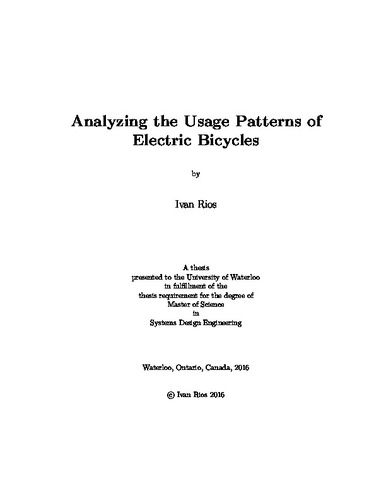| dc.description.abstract | Electric bicycles (e-bikes) are growing as an energy efficient alternative to public transportation, and cars. However, their adoption in North America has not increased at the same rate as in other countries like Germany, and China. Additionally, very few studies have been conducted to collect data about the patterns of usage of electric bikes. For these reasons, we distributed 31 e-bikes to staff, faculty members and students at the University of Waterloo in order to identify the main barriers and misconceptions about e-bikes, and obtain information about the riding habits of their users.
Each e-bike has a sensor kit that collects data about its location, battery state, acceleration, charging and discharging current, among other information. This data is constantly collected, therefore an algorithm had to be developed to analyze and identify trips. This algorithm is able to successfully identify 98\% of the trips without relying on GPS data and is an alternative for field trials that have problems with the geolocation data. Additionally, we processed charging data of each battery in order to analyze the charging patterns of the participants in our study.
The results obtained provided insights about the differences between segments of the population, range anxiety of participants, riding and charging patterns. We identified weather as one of the main factors that influence the riding habits of participants. Additionally, we determined that e-bikes are mostly used for commuting. Similarly, when analyzing charging events, we found that most of participants generally start charging their batteries when the state of charge (SOC) is above 30\% and in most of the cases, they prefer to charge until it is full. The results obtained in this thesis describe the main characteristics of riding and charging patterns of electric bikes, and can be used as an input for bicycle manufactures, policy makers, and utility companies to encourage the use of electric bikes in North America and prepare the infrastructure required for this transition. | en |

